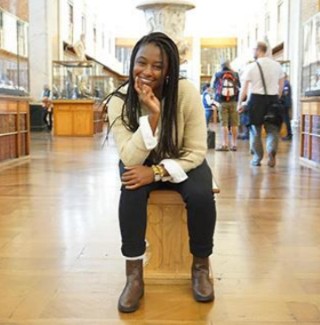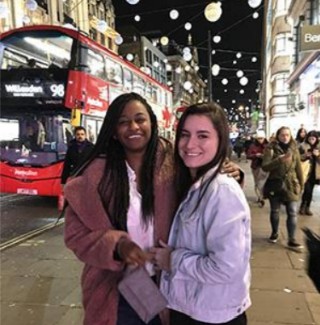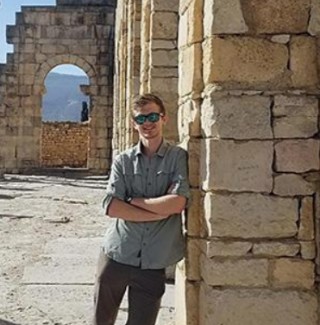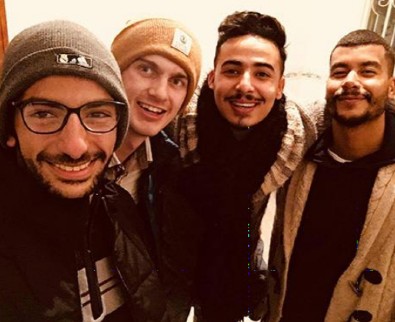From Abroad to the Classroom: How MFJS 3440 Shapes Reentry to the U.S.
One of the authors of this article, Morgan Carter, is a third-year media studies and international studies double major, with a double minor in Spanish and leadership. She is the president of the club rowing team, a part of DUPB Music Committee, and a big-time supporter of all things outdoors. After graduation, Morgan hopes to go on to law school.
Donovan Rice, the second author, is a third-year undergraduate student pursuing a double major in strategic communication and sociology. He is also triple minoring in writing, leadership, and business administration. He is an RA on campus and spends the weekends at Winter Park Ski Resort as part of the Volunteer Ski Patrol. He aspires to become a sociology professor.
Both students studied abroad in Fall 2017 and took MFJS 3440 in Winter 2018. Morgan studied abroad in London, United Kingdom. Donovan studied abroad in Meknes, Morocco. In this article, these authors discuss the ways that their experiences with the winter term course MFJS 3440: Global & Multicultural Campaigns provided a way for each of them to readjust after Study Abroad experiences. In turn, they found that their international experiences increased their appreciation for and comprehension of this course's content.
Morgan's Experience
When I decided to study abroad in London, I knew that I was in for a very different experience than I'd had studying abroad in Spain the previous summer. Santander, Spain had meant a home stay, a different language, and a small, quiet town located right on the beach.
London, I knew, was going to be very different. I anticipated culture shock and a completely different lifestyle going to Spain. London, in my mind, would be easy in comparison. With the same language and such a large and busy city, I figured that the adjustment would be minimal and the reverse culture shock nonexistent.
To some extent, I was right. But to a much greater extent, I was very, very wrong. Not unlike many other students who have studied abroad, my experience helped me to grow and change in important ways and I returned with different mindset than when I left.
Coming back to school, I had to hit the ground running. Winter quarter did not slow down, and aside from the first day questions of "Where did you study abroad?," I initially felt I would have no outlet for my experiences, nor any opportunities to incorporate the international knowledge and understanding I had gained from living in one of the most cosmopolitan cities in the world into my life and education.
The MFJS 3440 class was an incredible opportunity for me to continue to integrate my international experiences into my education, incorporating both my connections and communications from London and my other travels into my self-reflections.
Erika Polson, PhD, encourages lively and guided discussions in this class, inviting students to draw upon their experiences and bring them back into their studies. The course was a perfect way for me to feel that I was still learning and progressing in my international awareness and orientation, even after the return.
Although I did not experience the traditional "reverse culture shock," I did find I desperately craved a way to express what I had experienced, and to tie it into my major and my interests moving forward. The MFJS 3440 course helped me to do exactly that!
Donovan's Experience
Readjusting to U.S. culture was harder than I had anticipated. Perhaps the biggest reverse culture shock for me was time. After four months of a different pace of life, I found time in the US seems to move much more quickly.
Several days a week in Morocco, I would hang out with my local friends at the youth cafe. Lo and behold, I had more commitments back in the U.S. and could no longer afford such luxuries (if 70 cent Moroccan mint tea counts as luxury, and boy it sure does!). MFJS 3440 did not help in this regard; it didn't give me more time to socialize. That said, it did broaden my appreciation and vocabulary for global cultural differences.
Culture is like water to a fish. You don't really notice it until you're taken out of it. While the rest of my courses remained completely America-focused, it was nice to take a course where we looked at the rest of the world. It helped soften the blow. It helped reintroduce me to the local waters.
For the class, we had a project where we worked with a country. I selected Turkey. Although Turkey differs from Morocco in several ways (e.g., different language, government, etc.), it was nice to dive into a culture that still seemed familiar.
In fact, a couple of my Moroccan friends are obsessed with Turkish culture. I contacted them through Facebook Messenger and WhatsApp, and they assisted me with the class project, providing insights that are completely absent from English news reports.
Another enlightening moment in the course came in relation to Hofstede's Cultural Metrics. Hofstede Insights ranks countries' cultures on big-picture structural psychometrics such as "uncertainty avoidance," or how averse a culture is to uncertainty and change.
I was surprised to discover that Morocco is closer to American culture than France is. For the six metrics scoring 0 to 100, Morocco differs from the US an average of 26.9 points. France averages a difference of 27.3!
As for how my time abroad enhanced my experience in the classroom, I was able to draw parallels between class concepts and my lived experiences in Morocco. For example, when discussing the cultural metric of individualism versus collectivism, I shared my experiences with Morocco's collectivism.
I shared the example of a time I met with local friends. I arrived carrying an energy drink. After saying hello, one of my friends took the can and drank from it without asking. The can was then passed between everyone in the group before being returned to me. This benign moment highlights how collectivist Morocco is with possessions, particularly food and beverages. In Morocco, you share.
Overall, studying abroad and MFJS 3440 go hand-in-hand. I'm happy to have taken the course immediately after returning from abroad. I found that I could pull from lived experiences and the course itself helped remind me of the significance of those experiences for my life moving forward.






